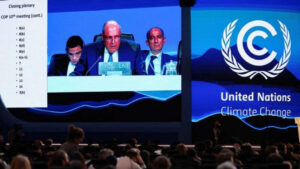Physical Address
23,24,25 & 26, 2nd Floor, Software Technology Park India, Opp: Garware Stadium,MIDC, Chikalthana, Aurangabad, Maharashtra – 431001 India
Physical Address
23,24,25 & 26, 2nd Floor, Software Technology Park India, Opp: Garware Stadium,MIDC, Chikalthana, Aurangabad, Maharashtra – 431001 India

For nearly three decades, developing countries have been requesting loss and damage money from rich, developed nations to compensate for the costs of destructive storms, heat waves, and droughts caused by global warming. This has finally become a reality in the UN Climate Summit in Egypt after an extension saw a breakthrough that almost threatened to prove inconclusive even on the extended day of COP27.
In a historic decision, a fund to aid poor, vulnerable countries deal with climate disasters made worse by the pollution emitted by wealthier nations that is dangerously warming the world was agreed upon by negotiators from almost 200 countries on Sunday, November 20, 2022.
The agreement, however, says that countries cannot be held legally responsible for these payments and many other details still need to be figured out. Over the next year, a committee with representatives from 24 countries will try to figure out the form of the fund, the countries that should contribute to this fund and where the money will ultimately go.
Critics have now pointed out that the creation of the loss and damage fund seems to be the only bright spot as otherwise, the climate summit this year does little to strengthen the efforts to tackle the main cause of global warming. India seems to be on the center stage in these discussions and debates.
Phase down all fossil fuels
The proposal ‘phase-down all fossil fuels’ essentially means phasing down the usage of all fossil fuels by nations of the world to restrict average global temperature rise within 1.5-degree celsius and also to achieve net zero. India took the lead this year at COP27 by making a proposal to include a provision calling for a phase-down for all fossil fuels in the final agreement. Many countries including the European Union had expressed support for this proposal. Later the US too expressed support for this along with the UK.
India wanting to include ‘phase-down all fossil fuels’ actually comes from the Glasgow declaration that had called for a phase-down of coal. During the Glasgow Climate Summit, a standoff had taken place between India and other major economies who wanted to include ‘phase out’ and India had insisted on ‘phase down’. While COP26 was about standoff related to phrases ‘phase down’ and ‘phase out’, this year at COP27 the standoff seemed to be about going one step further than COP26 and covering all fossil fuels instead of just coal in the ‘phase down’.
India is still heavily reliant on coal and thus It wanting to bring back the focus on all fossil fuels and not just coal is being seen as a well-calculated diplomatic offensive. This however did not seem to work out eventually as various countries that are rich in fossil fuels like gas and oil seemed to backtrack from agreeing to phase down all fossil fuels.
The world has waited far too long
Speaking at the Closing Plenary of the COP27, the leader of the Indian delegation and the Union Minister of Environment, Forest and Climate Change Shri Bhupender Yadav termed it a historic COP because of the agreement that has been secured for loss and damage funding arrangements including setting up a loss and damage fund. The world has waited far too long for this, the Minister said.
India also welcomed the ‘inclusion of transition to sustainable lifestyles and sustainable patterns of consumption and production’ in the cover decision. The inclusion of ‘sustainable lifestyle’ in the implementation plan at COP27 is a significant step in terms of India as earlier Prime Minister Narendra Modi had made the pitch for an environmentally-friendly lifestyle through his mantra of Mission LiFE (lifestyle for environment).
Agriculture should not be clubbed with mitigation
India also pointed out that agriculture should not be clubbed with mitigation, reiterating a long-time stand of India. It has kept mitigation in agriculture out of its nationally determined contributions.
“We note that we are establishing a 4 year work program on climate action in agriculture and food security. Agriculture, the mainstay of livelihoods of millions of smallholder farmers, will be hard hit from climate change. So, we should not burden them with mitigation responsibilities,” the Minister said.
Attempts by many European nations to relate methane release with India’s agricultural industry, mainly from manure and gastroenteric releases of animals, is well-known in this regard.
Just transition and coal
India also tried to delink just transition from coal phaseout when it said that for most developing countries, just transition cannot be equated with decarbonization, but with low-carbon development.
“Developing countries need independence in their choice of energy mix, and in achieving the SDGs,” the Minister said.
India also stressed the fact that the developed countries taking the lead in climate action is a very important aspect of the global just transition.
India will seek money from Loss and Damage Fund
Stating that there was no question of India providing any fund to the proposed loss and damage facility as it was itself a developing country, the Union Minister reportedly said that India will seek money from the fund since it is one of the most climatically affected countries in the world.
“Of course, the priority will be given to least developed countries and small island nations. But our vulnerable areas (such as Lakshadweep, Sundarban etc.) too will benefit from such funds,” TOI quoted the Union Minister as saying.
Comments are closed.
[…] read this in English | […]